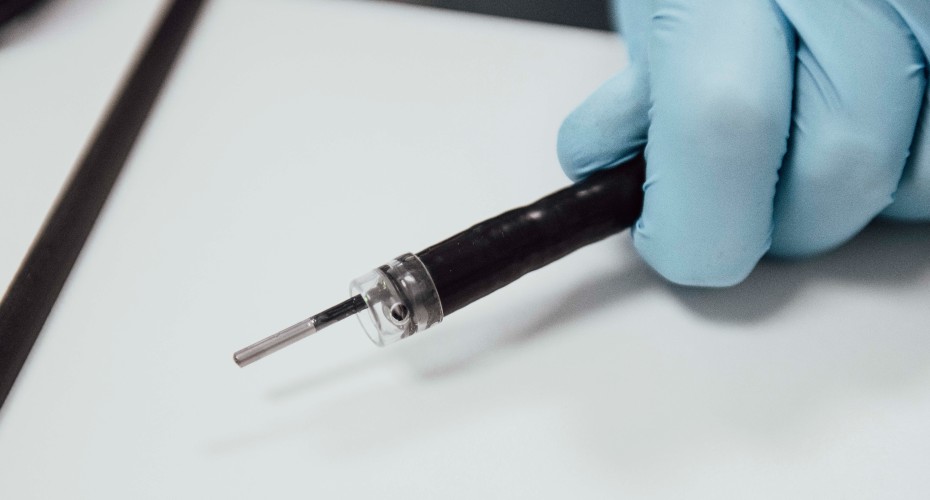Smart probe for oesophageal cancer diagnosis begins human trials

Surgeons and scientists are now undertaking clinical trials for a pioneering new technique that could detect and diagnose one of the deadliest forms of cancer within seconds.
Surgeons and scientists are now undertaking clinical trials for a pioneering new technique that could detect and diagnose one of the deadliest forms of cancer within seconds.
A team of experts from the University of Exeter, University of Bristol, and Gloucestershire Hospitals NHS Foundation Trust has developed a ground-breaking technique to help detect and diagnose oesophageal (food pipe) cancers.
The project, led by Prof Nick Stone at the University of Exeter, is called RaPIDE (Raman Probe for In-vivo Diagnostics (during oesophageal) Endoscopy), was initially funded by the National Institute for Health and Care Research (NIHR). The NIHR is the research partner of the NHS, public health and social care.
The new medical device uses light to pinpoint cancerous tissues or cells almost instantaneously, using a laser-based technique called Raman spectroscopy. This new approach could significantly reduce the time for diagnosis and treatment by providing results in under 30 seconds, compared to up to two weeks for current diagnosis techniques.
The technique allows medical experts to measure the light scattered by tissues when a low-power laser is shone onto it, as the light changes if it is on healthy or diseased tissues, meaning pre-cancerous or cancerous tissues can be detected rapidly.
The joint research team have started undertaking clinical trials involving patients regularly screened for oesophageal cancers to help demonstrate the technique and reveal the true extent to which this new diagnostic tool could be used across the healthcare system. To date, nineteen endoscopy patients at Gloucestershire Hospitals NHS Foundation Trust have been measured with the device.
Mr Oliver Old, Consultant Upper GI Surgeon, from Gloucestershire Hospitals, said: “We are excited by the prospect of introducing this new technology to benefit patients. It has the potential to achieve more accurate and earlier diagnosis of oesophageal cancer. Early detection is crucial to improving outcomes. We now have the ability to treat early cancer with endoscopic techniques and avoid major surgery. This technology can help us to target these early cancers more accurately, improving cure rates and reducing the need for major surgery.”
Cancer of the oesophagus is the fourteenth most common cancer in the UK (2016-2018, CRUK), and is the 7th most common cause of cancer death in the UK (CRUK).
One of the factors that makes it so deadly is that it is often discovered late due to minimal symptoms, making successful treatment difficult.
The new technique uses a miniature optical probe that slides through a channel in the endoscope (telescope) to the surface of the oesophagus. Medical professionals are then able to see whether the light patterns can reveal cancerous changes in the lining of the oesophagus quickly, safely and avoiding the need for an invasive biopsy.
The technique has been used previously on oesophageal tissue biopsy samples from over 500 patients. This new phase of the research is the first study demonstrating the technology in patients.
Signals from the probe are analysed by a computer and can be processed by the latest AI to aid the clinician’s decisions.
Prof Nick Stone, Professor of Biomedical Imaging and Biosensing, and Deputy Pro-Vice-Chancellor at the University of Exeter, who runs the research said: “This work has demonstrated the importance of working with a strong collaborative team over many years. We have worked together in understanding the molecular changes that are associated with early oesophageal cancers and developed a rapid method to measure this using only light.”
Dr Alex Dudgeon, Research Fellow at the University of Exeter said “If we can diagnose cancers and other abnormal changes with our device in seconds, without removing any tissue, this would revolutionise the field, saving time and the NHS money. With an instant diagnosis, treatment can be started earlier which will improve patient outcomes.”
Dr John Day, Senior Research Fellow at the University of Bristol said “The technique we are pioneering here has applications for the diagnosis of many other forms of cancer and disease. We are also developing probes to look at lymphomas and neuromuscular disease which we plan to trial in the near future.”
Dr Catherine Kendall, Consultant Clinical Scientist at Gloucestershire Hospitals said, “As we celebrated Healthcare Science Week, 11-15th March, it was really exciting to be part of work developing new techniques, to provide additional information to clinicians to aid diagnosis. The application of science for patient benefit.”
More information can be found at https://rapide-diagnostics.co.uk/



